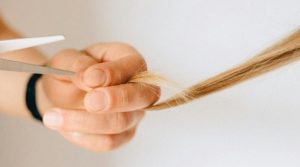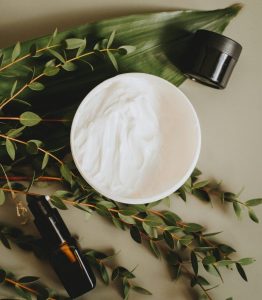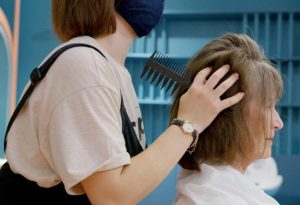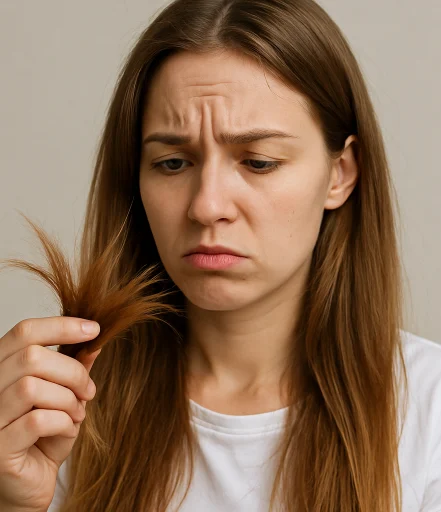Let’s be honest—the best hair remedy for split ends isn’t always hiding in an expensive salon bottle. In fact, one of the most frustrating hair struggles I’ve faced (and seen with clients) is brittle, frayed ends that just won’t cooperate—no matter how much you trim. But here’s the good news: you can absolutely repair and prevent split ends at home using natural, science-backed methods.
Now, I’ve worked in SEO-driven beauty content for over a decade, and I’ve tested nearly every trend and treatment under the sun. From deep conditioning for split ends to DIY hair masks for split ends, this article is packed with what truly works—not hype. Whether you’re dealing with heat damage, over-brushing, or just dryness, the home remedies for split ends I’m about to share are affordable, effective, and completely natural.
In this guide, you’ll learn:
What really causes split ends (it’s not just heat!)
How to spot early signs of hair damage
My favorite oils for damaged hair that actually nourish from root to tip
A breakdown of the best DIY treatments that prevent split ends naturally
And yes, I’ll also share when to trim vs repair split ends—because knowing the difference matters.
By the end of this read, you’ll be armed with proven split end treatments at home that will help your hair look smoother, stronger, and healthier—without breaking the bank.
Let’s dive into the root of the problem (literally), starting with what causes those pesky splits in the first place.
What Causes Split Ends?

If you’re constantly battling frayed and fragile hair tips, it’s important to first understand the causes of split ends. These tiny hair fractures are signs of damaged hair ends, and once the cuticle is compromised, it can’t “heal” itself. But with the right care, you can prevent new ones from forming—and even delay trims.
Here are the most common culprits I’ve seen ruin healthy hair:
1. Heat Styling Tools
Flat irons, curling wands, and blow dryers are major offenders. They weaken the hair shaft over time by stripping moisture and breaking down proteins, especially without a heat protectant.
Pro tip: Always apply a thermal heat spray and keep the temperature under 350°F to minimize damage.
2. Chemical Exposure
Frequent hair coloring, bleaching, or relaxing can lead to chemical burns on your strands, causing ends to split and break. Even ammonia-free dyes can be harsh over time.
Instead of frequent dye jobs, consider safer alternatives like henna or natural glossing treatments.
3. Environmental Factors
Sun exposure, pollution, harsh winds, and pool chlorine don’t just affect your skin—they’re rough on your hair, too. These elements dry out your ends and leave them prone to cracking.
Tip: Wear a hat or scarf when outdoors and rinse your hair after swimming.
4. Mechanical Damage
Ever brush your hair right after a shower? That’s a split-end waiting to happen. Wet hair is more elastic and fragile. Using rough towels or tight hairstyles also weakens the strands from the outside in.
Use a wide-tooth comb and switch to a microfiber towel or cotton T-shirt to pat-dry gently.
5. Poor Hair Care Habits
Skipping conditioner, using alcohol-based styling products, and not trimming regularly are all habits that sabotage your hair’s health.
A simple tweak in your routine—like switching to a sulfate-free shampoo or doing weekly deep conditioning—can make a world of difference.
Signs Your Hair Needs a Remedy

How do you know when your hair is just dry—or when it’s truly damaged and in need of a serious reset? Over the years, I’ve learned to spot the signs of hair damage early, and I teach others to listen to what their hair is telling them before things get worse.
Here are five key symptoms that your strands are crying out for a split end remedy:
1. Brittle Hair Ends That Snap Easily
Healthy hair is elastic. If the ends feel rough, dry, and break off when you run your fingers through them, it’s a major sign you’ve got damaged hair ends. Split strands often look like a Y-shape or frayed thread.
2. Rough Texture and Lack of Smoothness
Split ends disturb the hair cuticle, causing a sandpaper-like texture. If your ends feel straw-like or stiff (even after using conditioner), that’s a clear indicator of deep damage.
3. Dullness and Lack of Shine
Brittle hair ends reflect less light. When the hair cuticle is smooth and sealed, it shines. When it’s lifted or split, the hair looks lifeless and matte. No amount of serum will fully fix this without targeted treatment.
4. Knots and Difficulty Detangling
Split ends tend to tangle more often because of their jagged, uneven surfaces. If your brush frequently snags at the bottom, your hair likely needs a trim and some extra TLC.
5. Frizz and Uneven Lengths
Notice frizz mostly concentrated on the lower ends of your hair? That’s often split ends sticking out and breaking at different lengths. It gives your hair a wispy, unkempt look—even if you just styled it.
Why Natural Remedies Work for Split Ends
If you’ve ever felt frustrated with products that promise to “seal split ends” but deliver zero long-term results, I get it—I’ve been there too. After trying countless serums, leave-ins, and so-called miracle sprays, I discovered that the natural treatment for split ends often works better. Why? Because it targets the root causes: dryness, protein loss, and environmental damage.
Here’s why I swear by home remedies and teach others to use them:
1. Avoids Harsh Chemicals
Many commercial treatments contain alcohols, silicones, and synthetic ingredients that create temporary smoothness—but actually dry out your hair over time. Home remedies for split ends are free of sulfates and toxins, making them safer for long-term use.
2. Restores Moisture and Strength
Natural oils like coconut oil, argan oil, and castor oil are rich in fatty acids and vitamins that penetrate the hair shaft, repairing damage from within. These oils rebuild strength and elasticity, which are essential to prevent split ends naturally.
3. Rich in Antioxidants and Nutrients
Ingredients like avocado, egg yolk, banana, and honey provide protein, antioxidants, and natural enzymes that help repair damaged hair ends. Unlike synthetic products that coat the hair, these nourish each strand from the inside out.
4. Cost-Effective and Easy to Make
Let’s be real—salon-quality treatments can cost a fortune. Natural remedies are budget-friendly and use ingredients you probably already have in your kitchen. Plus, they’re customizable to your hair type.
5. Gentle on All Hair Types
Whether your hair is curly, straight, fine, or color-treated, home remedies for split ends are gentle enough for regular use and effective across all textures.
Top 10 Best Hair Remedies for Split Ends

1. Coconut Oil Deep Conditioning
Keywords: coconut oil for split ends, hair oiling
If I had to choose one staple for hair rescue, it’s coconut oil for split ends. This nutrient-dense oil penetrates the hair shaft to lock in moisture and reduce protein loss—two essentials for healing split ends.
How to use it:
Warm 2–3 tablespoons of organic coconut oil.
Massage it gently into your hair, focusing on the ends.
Leave it on overnight under a shower cap.
Wash out with a mild shampoo in the morning.
This traditional hair oiling method can be done 2–3 times a week.
2. Aloe Vera Hair Mask
Keywords: aloe vera for split ends, hydrating hair mask
Aloe vera is more than just a skin soother. It delivers deep hydration and repairs brittle hair ends naturally, making it a great hydrating hair mask ingredient.
DIY Mask:
Mix 3 tablespoons of aloe vera gel with 1 tablespoon of olive oil.
Apply from mid-length to ends.
Leave for 30–40 minutes, then rinse.
Use weekly to improve softness and elasticity.
3. Egg and Olive Oil Treatment
Keywords: egg mask for hair repair, olive oil for damaged hair
An egg mask for hair repair is rich in protein—perfect for reinforcing the structural integrity of your strands. Pairing it with olive oil restores shine and smoothness.
How to make it:
Beat 1 egg and mix with 2 tablespoons of olive oil.
Apply thoroughly and leave on for 20–30 minutes.
Rinse with cool water and mild shampoo.
Repeat every two weeks.
4. Avocado and Honey Mask
Keywords: avocado mask for split ends, natural hair remedy
This natural hair remedy is packed with biotin, vitamins A, D, and E—everything your ends crave.
Easy recipe:
Mash 1 ripe avocado and mix with 1 tablespoon of honey.
Apply to damp hair ends.
Leave on for 30 minutes before rinsing.
Ideal for deep nourishment once a week.
5. Castor Oil and Almond Oil Blend
Keywords: oils for damaged ends, oil mix for split ends
Castor oil’s thick consistency helps seal split ends, while almond oil softens and adds shine. This oil mix for split ends is great for sealing and strengthening.
Blend ratio:
1 part castor oil + 2 parts almond oil.
Warm slightly, apply to ends, and leave on for 1 hour (or overnight).
Use 1–2 times per week.
6. Banana Hair Mask
Keywords: banana mask for dry hair, remedy for split ends
Bananas are rich in potassium, which helps restore hair elasticity and prevent breakage.
Remedy mix:
Mash 1 banana with 1 tablespoon of honey and 1 tablespoon of yogurt.
Apply from mid-length to ends.
Leave on for 25–30 minutes, then rinse.
Best for dry, coarse hair once weekly.
7. Yogurt and Honey Conditioner
Keywords: DIY conditioner for split ends, fermented remedy
This DIY conditioner for split ends helps strengthen the hair cuticle and improve scalp health, thanks to probiotics in yogurt.
How to use:
Mix 2 tablespoons plain yogurt with 1 tablespoon honey.
Apply 30 minutes before shampooing as a pre-wash treatment.
Perfect for fine or frizzy hair.
8. Papaya and Coconut Milk
Keywords: papaya hair remedy, fruit mask for hair
Papaya contains enzymes that gently exfoliate and remove product buildup, making it an ideal fruit mask for hair that’s dull or lifeless.
Mask blend:
Blend ½ ripe papaya with 2 tablespoons of coconut milk.
Apply to hair and let sit for 30 minutes.
Rinse thoroughly.
Use bi-weekly for best results.
9. Argan Oil Serum
Keywords: argan oil for hair ends, natural hair serum
A few drops of argan oil for hair ends can protect against daily wear and tear. Use it as a natural hair serum after styling.
Application tip:
Rub 2–3 drops between palms and smooth onto the ends.
Use on damp or dry hair.
Great for daily maintenance.
10. Rice Water Rinse
Keywords: rice water for hair repair, split end rinse
Rice water contains amino acids and inositol that strengthen strands from root to tip.
How to use:
Soak ½ cup of rice in 2 cups water for 24 hours.
Strain and use as a final rinse after shampooing.
Let it sit for 5–10 minutes before rinsing with clean water.
Repeat 1–2 times per week.
Hair Care Habits to Prevent Split Ends Naturally

While home remedies can help repair existing damage, prevention is what truly keeps your hair thriving long term. Over the years, I’ve developed and taught these healthy hair habits to clients—and they work wonders if you want to prevent split ends naturally.
Here’s what to build into your routine:
1. Regular Trims and Dusting
Trimming every 6–8 weeks keeps splits from traveling up the shaft. If you’re growing your hair and worried about losing length, try dusting—a technique that removes only the damaged tips without affecting your overall style.
2. Use a Microfiber Towel or Air-Dry
Regular towels create friction that frays the hair cuticle. Swap them for a microfiber towel or a soft cotton T-shirt. Better yet, let your hair air-dry whenever possible to retain moisture and strength.
3. Reduce Heat Styling and Harsh Products
Frequent heat styling with no protection is a top cause of damaged hair ends. Use tools sparingly, apply a quality heat protectant, and avoid alcohol-based products that dry out your hair.
4. Sleep on Silk Pillowcases
Cotton pillowcases create friction and absorb your hair’s natural oils. Silk pillowcases reduce breakage, preserve moisture, and protect your ends while you sleep.
5. Detangle Gently with a Wide-Tooth Comb
Avoid tugging on knots, especially when your hair is wet. Use a wide-tooth comb, start from the ends, and work upward. Apply a leave-in conditioner if needed to glide through with ease.
When to Trim vs Repair Split Ends

Keywords: trim split ends vs repair, hair damage management
Let’s clear this up: not all split ends require a full haircut. Understanding when to trim split ends vs repair can help you manage damage without compromising your length.
When to Repair at Home
If the splits are recent and only affect the outer layers, DIY home remedies can work effectively. You’ll see improvement with deep conditioning masks and consistent care.
Look for:
Slight fraying
Minor breakage
Ends that feel rough but not snapping off
When to Get a Salon Trim
If the splits have traveled upward or your hair feels straw-like from mid-length to ends, no mask will reverse that. A salon trim is necessary to stop the damage from spreading.
Look for:
Tangled, knotty ends
Y-shaped or feathered strands
Loss of curl pattern or structure
How Often to Trim Without Losing Length
Stick to a light trim every 8–10 weeks. If you’re dusting your ends regularly and using protective styling, you’ll maintain your length while keeping your hair strong and clean.
Frequently Asked Questions
These are the most common questions I get about how to prevent and repair split ends naturally. Here are the answers—straightforward, honest, and experience-backed.
Q1: What is the best natural remedy for split ends?
Coconut oil deep conditioning is widely considered the best natural remedy for split ends. It penetrates the hair shaft, reduces protein loss, and seals in moisture—helping to smooth and protect damaged ends over time.
Q2: Can I repair split ends without cutting my hair?
You can temporarily repair split ends and prevent them from worsening using treatments like egg masks, aloe vera, or castor oil blends, but the only permanent fix is trimming. Home remedies can improve appearance and delay the need for a cut.
Q3: How often should I apply hair masks for split ends?
For best results, apply a hair mask for split ends once or twice a week. Consistency matters more than frequency. Choose masks based on your hair type—for example, rich oils for coarse hair or lighter formulas for fine strands.
Q4: Is coconut oil good for split ends?
Yes, coconut oil for split ends is one of the most effective treatments. It prevents further breakage, adds shine, and deeply nourishes brittle ends—especially when used as an overnight treatment.
Q5: Does trimming split ends help hair grow faster?
Trimming doesn’t speed up hair growth, but it prevents split ends from breaking upward, which maintains your length. Healthy ends = stronger growth retention.
Q6: Are there any overnight remedies for split ends?
Yes! The best overnight remedies for split ends include warm coconut oil, castor and almond oil blends, or a light argan oil serum. Wrap your hair in a silk scarf or sleep on a silk pillowcase for added protection.
Q7: Which oil is best for split ends repair?
Some of the top oils for split ends repair include:
Coconut oil for moisture and protein retention
Argan oil for smoothness and shine
Castor oil for strength
Almond oil for softness and flexibility
Use a mix for best results.
Q8: Can rice water fix split ends naturally?
Rice water strengthens hair with inositol and amino acids. While it won’t seal split ends, it reduces breakage and improves elasticity—helping to prevent future splits when used regularly as a rinse.
Conclusion: Restore and Protect Your Hair—Naturally

If you’re tired of masking the damage and ready to actually fix it, these best hair remedies for split ends offer a gentle, affordable, and effective solution. From a nourishing coconut oil overnight mask to a protein-packed egg and olive oil treatment, every remedy I’ve shared targets the root cause of damaged hair ends—not just the symptoms.
What I love most about these home remedies for split ends is how accessible they are. You don’t need expensive salon treatments or complicated products. All it takes is a little consistency, some kitchen staples, and a commitment to treating your hair with kindness.
Before you go, here are a few final tips to make these remedies work even harder:
Use a wide-tooth comb to avoid breakage when detangling.
Trim your ends every 6–8 weeks to prevent splits from traveling upward.
Switch to a sulfate-free shampoo and avoid washing with hot water.
Always apply a heat protectant if you style with tools.
If you stick with these strategies, you’ll start to notice smoother, shinier, and stronger hair—without the split ends weighing you down.
Outbound Resource: For more expert-backed guidance, check out this article from the American Academy of Dermatology on hair care basics.
- 7+ Proven Home Remedies for Sneezing That Actually Work - August 2, 2025
- 10 Natural Remedies for Eczema Relief - June 5, 2025
- How to Clean Pool Table Felt Without Damaging the Surface - May 9, 2025

